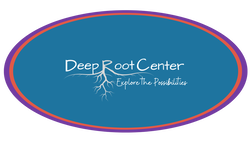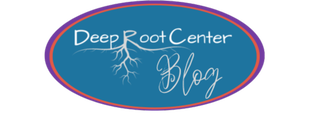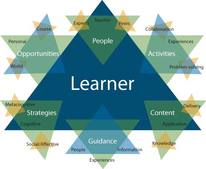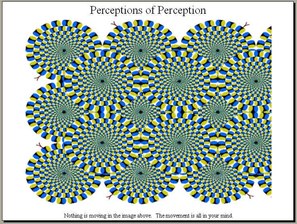 This is a continued exploration of the dynamics behind the student/learner centered educational philosophy and how subtleties within the English language influence the meaning of certain words. For instance the two phrases: I have to and I want to. In our everyday lives, we often use I have to instead of I want to when we really do have options. However, when you hear a child say, “I have to” in relation to homework, those words imply no personal choice at all, because of their direct correlation to school. The introduction of coercion or obligation, for most individuals, is the ultimate death knell to joyful curiosity and exploratory learning. I am a prime example of this phenomenon. If anyone tells me I have to do anything, I immediately lose interest. This is especially true when I feel I have to read something. I love reading, but the very implication of duty turns my curiosity off completely. One of DRC's board members has relayed a similar story about her nephew, who learned to read at a very young age. When he went to school and reading became a required thirty minute activity, he started setting the timer for exactly half an hour and would not read beyond the ding of the bell. On the other hand, when the student is provided the chance to say, I want to in response to an offered suggestion or idea, it is understood, in doing so, that they are taking full responsibility for that task or project. They are in charge of the choices; they are able to explore the idea fully and to their hearts content. The excitement for learning is fully present. When I meet a student for the first time, some of the first questions I ask are: What are you interested in? What do you like? What do you want to do? Often, kids have no idea how, or what to answer. They, sometimes, even seem suspicious of the questions. Then I offer it in another form: If you could choose to do anything, with no judgment attached (“bad or good”, “educational”, “dumb”, or “just playing around”), what would you do? This usually brings out a response couched in qualifications and disbelief. Kids can not seem to willingly accept that I (a teacher type person) am: number one, asking what they want to do, number two, willing to listen, and number three actually excited about making it possible. Many educators are fearful of free-form, interest-driven education. They believe it has the potential of introducing chaos, no opportunities for formal learning, and an all round un-scholarly atmosphere to the educational environment. They think if one child decides (is allowed) to leave an activity, they all will. Offering choice to a roomful of young people, I will admit, brings on a bit of excited chatter and unbridled enthusiasm. Especially if those children have never really been offered a similar opportunity in a classroom setting before. I was so very honored and fortunate to be able to test these theories with a Center full of young children, during DRC's Mid-Winter Break Workshops, this past week. On any given day there was an average of eight kids and the majority were boys between the ages of 5 and 8, who normally attend school. This would be the ideal participant sample for testing any educational theory. I discovered very quickly that these guys were very programmed to the clock. What time is lunch? Was definitely the big question for the first couple of days. I explained several times, “lunch-time” (otherwise known as the time the facilitator for the day was taking a break) was between 11:30 and 1:00, however, they could eat anytime they were hungry. Some took that at face value and grazed all day, others ate a snack and saved the rest for later in the day. There was an overarching theme each day that ranged from music, to art, to science. The kids were asked to listen to the facilitator introduce each activity or project. They were able to peel off and occupy themselves with another activity (Legos, blocks, plastic animals, drawing, staring off into space, etc...), if they were not interested. This last part was never an explicit message. It just happened. The kids who were completely engaged stayed with the activity for as long as it held their interest or until they completed the task. Other kids tried the activity for a while, but lost enthusiasm or became frustrated and left the table. Some of those, eventually came back to the project after a small break. Their brains were, possibly, working on it while they built a Lego spaceship or drew a picture. This free-form, free-flowing atmosphere never became a detriment to the planned activity or to learning, for that matter. It was loud and messy at times, admittedly, but there was never a “follow the leader” phenomenon at any point during the week. The kids were happy, engaged, and active participants in everything they chose to take part in. Yes, it is exhilarating and exhausting at the same time. You can't help but be impressed by the human ability to adapt and learn, as the swirl of activity engulfs your senses. I will argue that self-directed, independent learning works, because we (teachers and facilitators) are offering, asking and listening, not telling. We are completely involved in the learning process, from beginning to end. There is no agenda. We are unabashedly as excited about the activity or project as the kids. We are open to all possibilities and outcomes, because we are learning just as much as everyone around us. All those I have to's become I want to's because our enthusiastic presentation of choices and options becomes the game changer. When you are able to take charge of your education and make explicit decisions, it changes how you view learning. Your life becomes a joyful, completely unique, one of a kind, exciting, and adventurous voyage of discovery. With the introduction of choice, you become an empowered lifelong natural learner.
0 Comments
 These statements belong to two completely different educational philosophies. In fact, they are on opposite ends of the educational spectrum. The former represents a teacher/institutional centered pedagogy and the later demonstrates why learner directed education is desirable, natural, and so very successful. I have heard teachers say that it is their obligation as a teacher to make sure their students understand the information they present in a particular on-going class. There are at least five assumptions or presumptions hidden within that statement. The first is the idea that students, especially young people, are blank slates or empty vessels just waiting to be enlightened with profound knowledge. The second is the belief that students are actually going to retain all the information a teacher presents. The third assumes that it doesn't matter what the student is actually interested in or passionate about, everyone in our society must learn the same stuff. The fourth is that everyone acquires knowledge in the same way. Yes, there have been attempts to implement the “revolutionary” ideas around the concepts of learning styles and modes of intelligence. These methods, however, still promote top-down learning (a teacher knows all and relays that information to the students). And finally, there is a universal understanding that the institution and the teacher are in charge of the educational life of their students; they demand respect, accountability, and academic progress from the pupils and their families through testing, attendance policies, homework, punishment, and/or rewards. In an atmosphere or environment of self-directed or student-centered learning, the above assumptions are turned on their head. We know that children are not unformed beings just waiting for someone to “fill” them up with knowledge. From the very earliest age, they have thoughts and ideas that make them completely different than any other human in the history of humanity. We are all completely unique individuals. A learner-centered educational system recognizes that fact before any other. Not only are we all singular beings, we all have interests and passions that are not represented in the same combination in any other person. And, we are motivated to learn about the things we are most interested in; the excitement of discovery becomes the reward. There is no need for an outside presence to make sure, because the desire to acquire knowledge is intrinsically driven. So how does the make possible element come into play? I firmly believe that teachers are an important ingredient in the learning process. They are, however, facilitators of learning, not dictators or tyrants. Teachers in a self-directed learning environment provide options, ideas, resources, and a body of knowledge that students may not already be aware of. They celebrate and honor a youth's interests and strengths, while offering suggestions that complement or enhance the student's skills. They also provide encouragement and support when a student runs into an obstacle or challenge. Sometimes, they may even present a challenge to encourage growth and independence. Teaching and learning become a relationship of mutual respect and trust. I trust my students to tell me what is in their hearts. I respect their stories, their emotion, and the place they are in, at that given moment. In turn, they offer the same to me. We are equals. We each comprehend the imperfectness of being human. We all understand that mistakes are going to be made, but an opportunity to learn is always the result of those missteps. When someone asks my educational philosophy, I always respond that learning is a conversation not a lecture. It is a back and forth, a give and take, a mutually beneficial interaction. It is usually messy, disorganized, and loud, but it can also be quiet and introspective. It may involve books or the Internet or it could be a creative pursuit. Everyone acquires knowledge in a way that is completely unique. I will not judge what learning looks, sounds, feels, tastes, or smells like. At Deep Root Center, we make learning possible, whatever that personally means, for each individual who walks through our doors.  I have discovered that there is often a dramatic difference between how others view us and how we perceive ourselves. About a month ago, I participated in an exercise that asked me to enumerate my strengths. It took me a long time to think of what I am particularly good at (I could have easily written down at least two or three items for every other person there), and then it occurred to me--- one thing I am really good at is making it appear that I am confident in whatever I am doing or have agreed to take on. On the surface this appears to be pretty deceptive. I have, however, learned that my dedication and willingness to jump in and get things done is a skill which other people often associate with me. On the outside, I project this positive, can do attitude; meanwhile on the inside, I am a mass of quivering doubt and insecurity. Then I got thinking, are we all like this? Does everyone project one thing to the public while our internal voices are questioning our abilities, skills, or even intelligence. Based on exploring the idea of personal expectations in a post a few weeks ago, I ask myself, do the beliefs we have about ourselves rule both of these worlds? I expect that I am able to do difficult tasks because I am by nature an optimal, realist (my own invention which is a combination of optimist and realist). I am willing to take on these jobs, because, in the past I have been able to pull it off, and I have always appreciated a good challenge. But, internally, I start questioning and doubting. I won't digress into the interior dialogue; trust me when I say these innate conversations can be pretty discouraging and even petty. Despite this internal negativity, I am always, somehow, able to pull out the optimistic side and get the job done. Then I think about the part my ego may be playing in all this. Not only is our inside self different from our outside being, but our out in public self is very different from our at home, private self. We choose what we want people to see. In public, I choose to project the confident, decisive self instead of the wavering, insecure self. Because, I will get more done and people will appreciate my ability to positively contribute to my community. Hence, my ego gets fed with positive feedback. And there we are, back at personal choice. Making decisions that impact other lives as well as our own is something all of us have to come to terms with. Yes, being true to yourself is important, but when a particular behavior will hurt someone else, it is never a good option. Being pleasant and upbeat are choices I make on a daily basis because I like having the positive attributes of honesty, integrity, empathy, and willingness to work hard associated with my name. I also appreciate how my work can affect someone's day or life. The act of spreading good vibes isn't a sacrifice, it is an honor. 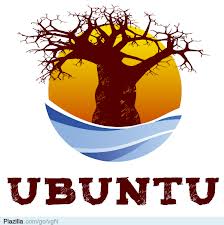 Ubuntu is an ancient word from the Nguni Bantu people of South Africa which expresses a way of being that encompasses equality, equity and compassion for all. The rough translation is: human kindness, or, I am what I am because of who we all are. I personally understand it to mean that: together we support one another to sustain the earth for every living thing. Can you imagine a more perfect word or concept? This practice of compassionate living has, until very recently, been embraced throughout human history; nearly all hunter-gatherer and egalitarian societies had a similar way of being. It even goes beyond anatomically modern humans, as there is now evidence that Neanderthals took care of one another, and researchers who study animal behavior say that non-human animals do this as well. When you sit quietly and really think about this philosophy it makes complete sense. If my neighbor isn't doing well, then in the end I will not be doing well either. If we support each other, together we are stronger than one individual. Humans are social beings and we are biologically designed to share our knowledge and life experiences. It is the essential ingredient that allowed our ancient ancestors to survive. We all exist because of the core values that support Ubuntu. In the past 100-150 years, this philosophy of egalitarianism and empathy has fallen by the wayside, or better yet, taken a back seat to the socially rewarded virtues of independence, rugged individualism, the ability to pull oneself up by the bootstraps, knowing how to play the game, ruthlessness, greed, dogged determination, discipline, self control, and will power. Yes we “teach” kids to “share” in school, but at the same time the unspoken, subliminal message of inequality and selfishness is always there through standardized testing, familial connections, and other built in biases. Those who get good grades and learn how to maneuver through the complicated maze of judgment and competition are viewed as successful, superior, and better than the others. This modern individualistic philosophy works for very few. Yes, there a some people at the very top of the pyramid who play the game really well and are rewarded generously. The people in the middle thought they understood the game, but became adults and realized they had been tricked into believing they had it all figured out. Then there are the masses on the very bottom who knew they never understood the rules, never fit in, and for the most part stopped trying. Basic survival takes all of their energy and is far more important than spending the time to learn how to spread their talents. All of their ideas, skills, and abilities are left to wither and die, before they have the opportunity to share them, therefore making all of society a poorer place. This is all a sad testament of our times. I would like to argue that we can recapture the very spirit that allowed our humanness to evolve. In previous posts, I have suggested we each deliberately chose to embrace kindness, integrity, empathy, and honesty in all we do. With those intentions, we can create a world where everyone consciously supplements those individual, positive attributes with the all encompassing Ubuntu spirit. We can decide to practice this philosophy without hesitation. When we do, the health and happiness of our neighbors and the greater world becomes more important than our individual desires. Sharing our knowledge, ideas, time, emotions, and resources will become an intrinsic part of our lives. Ubuntu: “I am, because you are.” I can not be truly happy, unless you are happy.” Whatever you are is what I am.” “Whatever I have belongs to us all.”.... Instead if being undefinable, as Desmond Tutu suggested when he said, “it is a very hard concept to render into western language,” we can each have our own way of expressing this life affirming philosophy. Ubuntu--- How will you choose to live it? |
|
© 2024 Whole Learners, Inc. 501(c)3
Deep Root Center
48 Riverside Drive, Canton, NY 13617
315*323*1435/[email protected]
Deep Root Center
48 Riverside Drive, Canton, NY 13617
315*323*1435/[email protected]
